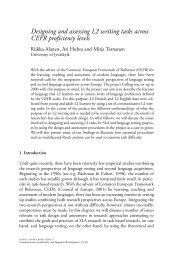BOOK OF ABSTRACTS - EUROSLA
BOOK OF ABSTRACTS - EUROSLA
BOOK OF ABSTRACTS - EUROSLA
Create successful ePaper yourself
Turn your PDF publications into a flip-book with our unique Google optimized e-Paper software.
learners introduce a story in medias res, while more advanced learners do<br />
prefatory work before launching the story (see Hellermann, 2008).<br />
This paper presents a qualitative single-case study of one Germanspeaking<br />
French L2 learner, au-pair girl during 9 months in a Frenchspeaking<br />
family. 7hrs of dinnertime conversations were recorded on a<br />
regular basis throughout her stay and transcribed. This study focuses on the<br />
linguistic and prosodic (e.g. hesitations) means mobilized when opening or<br />
closing a story. With our results we hope to show that changes are visible in<br />
terms of an increasing linguistic repertoire, but also in the way story<br />
openings and endings are interactionally managed. These changes, we argue,<br />
can then be interpreted as indicators of a developing L2 interactional<br />
competence.<br />
Hellermann, J. (2008). Social actions for classroom language learning. Clevedon:<br />
Multilingual Matters.<br />
Jefferson, G. (1978). Sequential aspects of storytelling in conversation. In J.<br />
Schenkein (Ed.), Studies in the organization of conversation al interaction. New<br />
York: Academic Press. 219-248.<br />
Regan, V., Howard, M. & Lemée, I. (2009). The acquisition of sociolinguistic<br />
competence in a study abroad context. London: Multilingual Matters.<br />
Sacks, H. (1992). Lectures on conversation. (Edited by G. Jefferson). Blackwell:<br />
Oxford.<br />
Wilkinson, S. (2002). The omnipresent classroom during summer study abroad:<br />
American students in conversation with their French hosts. The Modern<br />
Language Journal, 86 (2): 157-173.<br />
Diaspora Greek: Grammars in Contact or Incompletely Acquired<br />
Grammars?<br />
Katerina Zombolou<br />
La Trobe University<br />
Grammatical changes have been found in Greek spoken by bilingual adults<br />
in Argentina: (1) PP generalisation over genitive case, (2) accusative<br />
generalisation over nominative case in subject position, (3) misform in<br />
nominal plural inflection, (4) omission of the obligatory article in<br />
demonstratives, (5) clitic omission in clitic doubling, and (6) perfective<br />
generalisation over imperfective aspect.<br />
Investigating language contact in Diaspora provides evidence for<br />
unveiling the mechanisms of 'externally' versus 'internally' motivated<br />
changes in progress, and the 'internally' motivated changes may occur in the<br />
original language as well. Accordingly, the question arises: Do languages in<br />
Diaspora change under the influence of the hosting languages or because<br />
they follow patterns of internal development, in the sense of incomplete<br />
acquisition?<br />
45



